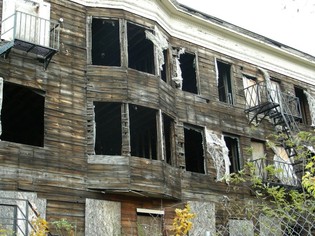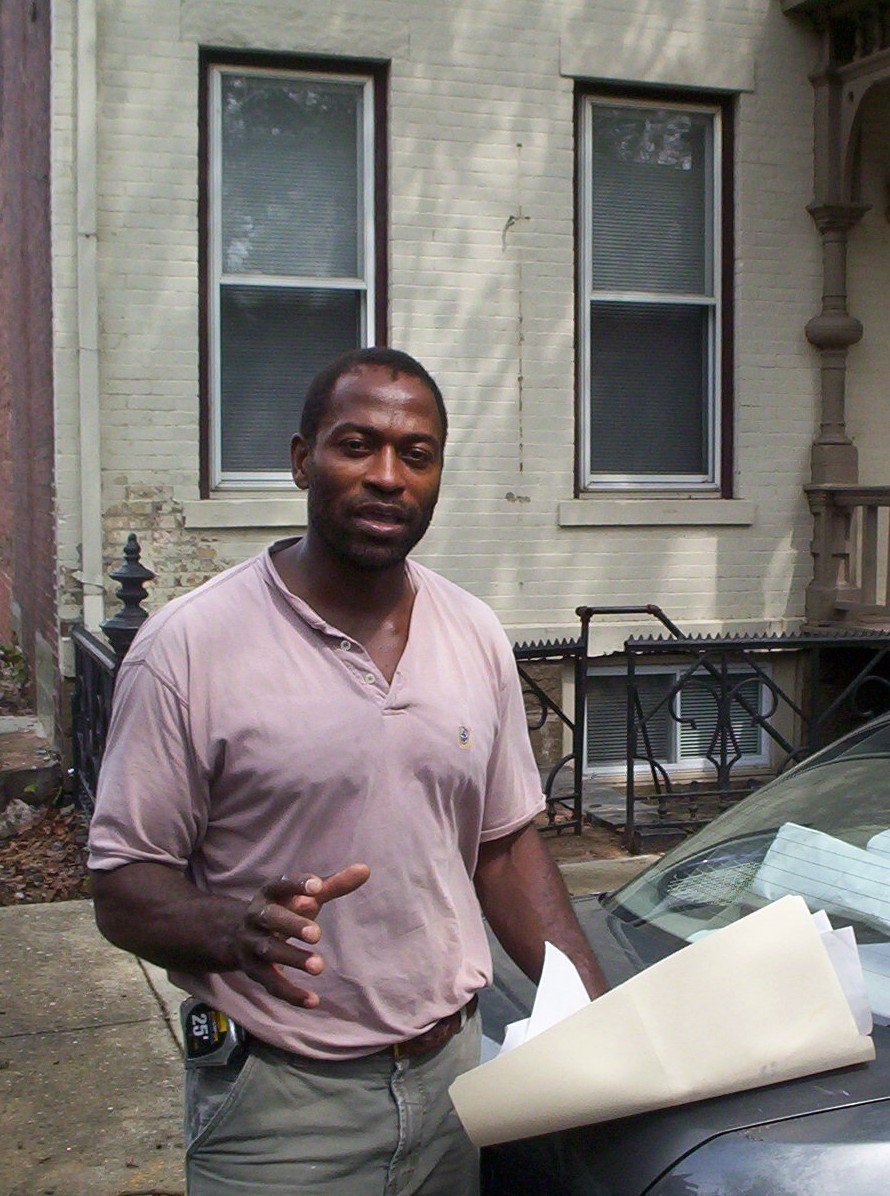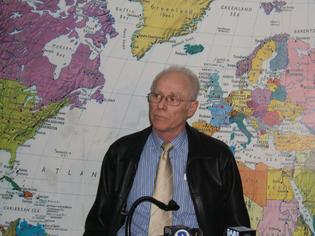
 The Winchester Avenue wreck above could come down by year’s end — as a three-year-old battle with a former NFL safety-turned-developer (pictured) enters the final quarter.
The Winchester Avenue wreck above could come down by year’s end — as a three-year-old battle with a former NFL safety-turned-developer (pictured) enters the final quarter.
Andrew Rizzo, chief of New Haven’s Livable City Initiative (LCI), said this week that he’s moving fast to demolish the three-story building at 235 Winchester. “I’m hoping it’s going to be down in the next month or two,” he said.
The 18-unit hulking brick corpse, near the corner of Henry Street and across from Science Park, has been weighing down a transitional stretch of the Dixwell neighborhood since builder Kenny Hill and the Livable City Initiative (LCI) became embroiled in a dispute over a lead-paint removal grant.
The two sides have negotiated, to no avail, as the building itself has remained a windowless, vacant testament to blight — a waste of more than $150,000 in government money meant to clean up properties. It has remained open to vagrants and surrounded by trash and overgrown weeds.
 So Rizzo (pictured) reissued a demolition order on Oct. 11 “due to the advanced deterioration and the possibility of structural failure… [I]n the interest of public safety and welfare of the City of New Haven, I have determined the structure to be unsafe in violation” of the city’s building code.
So Rizzo (pictured) reissued a demolition order on Oct. 11 “due to the advanced deterioration and the possibility of structural failure… [I]n the interest of public safety and welfare of the City of New Haven, I have determined the structure to be unsafe in violation” of the city’s building code.
Usually Rizzo would have to wait another 90-day “waiting period” to proceed with the demolition because the building has a National Preservation Trust historical listing. Rizzo invoked a city public-safety statute to waive that waiting period and has begun seeking demolition contractors.
“At this point,” Kenny Hill said this week, “we’re not going to have any choice” but to proceed with a long-threatened federal lawsuit to stop the demolition and to seek a six-figure recovery of money he claims he lost to city wrongdoing.
“We know” the demolition order could spark a suit, said Rizzo, who faults Hill, not the city, for the property’s woes. “I just decided I had to do something about the building” to protect the public.
From NFL To New Haven
“It is tragic that the property has sat there for the past few years,” Hill said. Hill (pictured at the top of this story) was a star cornerback for Yale’s football team. Then he went pro. Over a ten-year career (an eternity in the NFL), he played strong safety for three Super Bowl-winning teams, the Oakland (then L.A.) Raiders in 1981 and 1984 and the New York Giants in ’87. He returned to New Haven in 2000 to launch a home-buying and renovation company with a friend from Yale’s athletics department. (Click here for a previous story on his background.)
“There’s over $600,000 in that building,” he said of battered 235 Winchester. The figure comes from adding the $420,000 his partnership (MBMB LLC) spent to buy the property in 2003, money invested since then on preliminary work to renovate the 18 apartments, and a $168,000 federal loan administered by the city to remove lead paint.
That loan was the source of all the problems. Hill said the city forced him to hire an incompetent contractor to remove the lead. The contractor took the money and failed to remove the lead, Hill said.
 “We totally dispute that,” City Corporation Counsel John Ward (pictured) said this week. “They brought this guy in who wasn’t on our [approved] list. We put him on our list to make them happy.” Hill claimed he had never even heard of the contractor until the city insisted on hiring him.
“We totally dispute that,” City Corporation Counsel John Ward (pictured) said this week. “They brought this guy in who wasn’t on our [approved] list. We put him on our list to make them happy.” Hill claimed he had never even heard of the contractor until the city insisted on hiring him.
Read the details about that and a subsequent series of disputes in this previous Independent article. Two years after that article, the two sides are no closer to resolving the dispute, and the building has continued to deteriorate, dragging down the block. The two sides today disagree on who promised — and then failed — to keep the building secured, as well, the trigger for Rizzo’s demolition order.
“They make demands so ridiculous, it’s not worth responding to,” Ward said this week. Despite the lawsuit threat, “we’ve got to do something about it.”
“Clearly we could have gotten [the federal Department of Housing and Urban Development] involved” sooner in this dispute, Kenny Hill said. “We were probably mistakenly under the impression that the city wanted to resolve it.”
The city arranged a Sept. 1 foreclosure sale on 235 Winchester because Hill’s partnership owed over $20,000 in back taxes. The sale was cancelled at the last minute. Hill said he had refused to pay the taxes because in his view the city had caused the property to be worthless yet was continuing to charges taxes as though it were worth lots of money. He decided to pay the money at the last minute to stave off the foreclosure “on the advice of my attorney.”
He said he’s not giving up the property without a fight. “If they try to demolish this building now,” he vowed, “it’s going to be aproblem.”